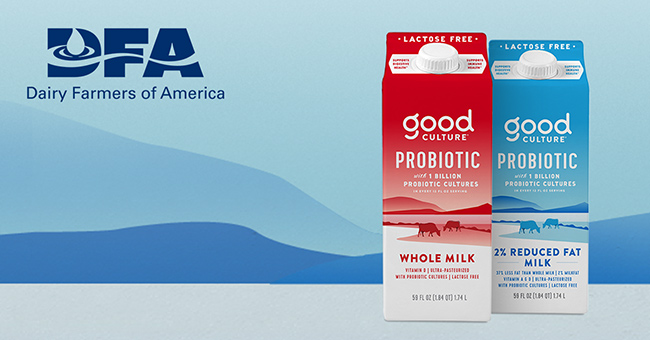Agricultural cooperative Dairy Farmers of America (DFA) has entered a licensing agreement with cultured dairy brand Good Culture to make a probiotic fluid milk catering to younger consumers’ desire for more functional benefits.
Although the new product will feature Good Culture’s label, it will be produced, marketed and distributed by DFA, a farmer-owned, family cooperative owned by over 7,500 dairy producers.
The 59 oz. containers of lactose-free whole and 2% milk products boast 1 billion probiotic cultures supporting digestive health and the immune system. The two SKUs will retail between $4.99 and $5.99. For now, DFA is producing the probiotic milks out of its Bridgeton, N.J. facility and would not comment on the capacity at this point but expects to expand production as distribution increases.
Initially, the milks are launching on the East Coast with distribution already chainwide in Publix and Harris Teeter locations. Other retailers like Stop and Shop, Hannafords, Market Basket, Giant and Whole Foods are expected to carry the product in coming weeks.
Good Culture, founded in Irvine, California in 2015, is known for its cultured cottage cheeses, sour cream and cream cheese but this will be the brand’s first liquid product. It is also the first time the company has licensed its patented probiotic culture signally the brand’s possible move into becoming a novel ingredient provider. The brand reported it was always open to ideas that “solve a real consumer need” but has no other partnerships planned at the moment.
“This launch continues to support our vision of becoming a platform cultured foods brand with a focus on gut health and overall wellness,” Good Culture CEO and co-founder Jesse Merrill said. “Good Culture would not have been able to launch this product without their [DFA’s] robust innovation and R&D capabilities.”
The company closed a $64 million funding round last February targeting $100 million in sales growth.
DFA is no stranger to bringing dairy products to market in fluid milk, cheese, butter, ice cream and dairy ingredients. It produces regional brands such as Alta Dena Dairy, Meadow Gold Dairy, Friendly’s, Borden Cheese, Plugrá Premium Butter and Kemps, among others.
Partnering with Good Culture was “the perfect fit,” DFA senior VP of marketing and innovation Rachel Kyllo told BevNET on Thursday. “They have strong equity as a brand in the probiotic space. They over-index with millennial consumers and as we think about bringing this brand new, innovative probiotic milk to consumers we know it’s going to be important to appeal to a younger consumer.”
DFA’s internal data shows that “both value-added dairy milk and plant-based milk volume skews to Millennials (many with kids in the household) and Gen Z.”
The North American functional milk market was valued at $7.03 billion in 2022 and is expected to grow at a CAGR of approximately 6.42% from 2022 to 2028, according to recent market research by Report Linker. The report noted that the growth in functional dairy is not just among younger consumers though but also the geriatric population and hospitalized patients who value fortified food products in their diets.
Lactose-free milk offerings have grown in the dairy aisle with brands like Fairlife, Organic Valley and Horizon all launching products in the space. Smaller brands like Slate Milk have capitalized on the protein potential of lactose-free dairy, positioning the product as a fitness beverage. The a2 Milk Company, based in Australia, has built its brand around being a gut-friendly alternative to conventional milks that contain the a1 beta-casein protein that can cause digestive issues.
The growth of the functional fluid milk category could offer even more opportunity for an industry that has suffered from the loss of a huge chunk of consumers moving to alternative, plant-based milk options. Last April, family-owned dairy producer Clover Sonoma leaned into value-added with the launch of a line of functional, ayurvedic Moon Milks made from the blending of 2% organic milk with herbs and spices.
Food technology companies have been pushing into the category as well. Precision fermentation food business Perfect Day partnered with Tomorrow Farms on the animal-free dairy milk brand Bored Cow in May. In September, Perfect Day announced it was bringing its technological expertise to partner with Nestlé on a different animal-free dairy beverage, Cowabunga.
Conventional milk is still 85% of the category and is expected to be the bulk of fluid milk sales in the near term, Kyllo said, but future growth will be in the value-added segment that offers the lactose-free and digestive health benefits of a probiotic beverage that tastes the same as conventional milk.
“Products, like kefir or kombucha, that would offer similar benefits are a little bit of an acquired taste. But this was a way to get probiotics in a product they already consume and consume very regularly,” she said. “If we can continue to add additional benefits. We think it will just help keep the product contemporary and get consumers engaged.”
